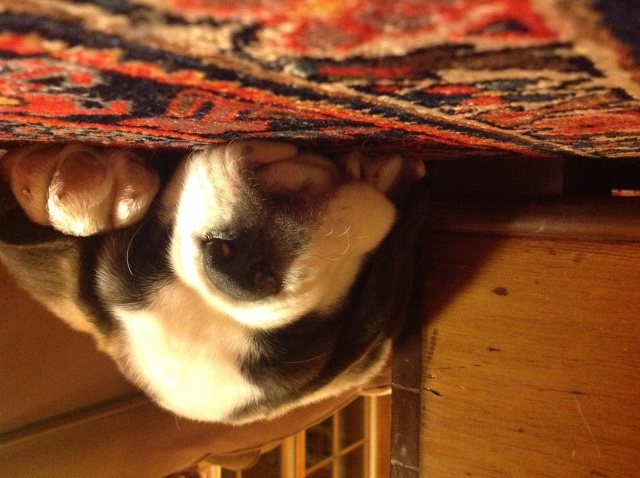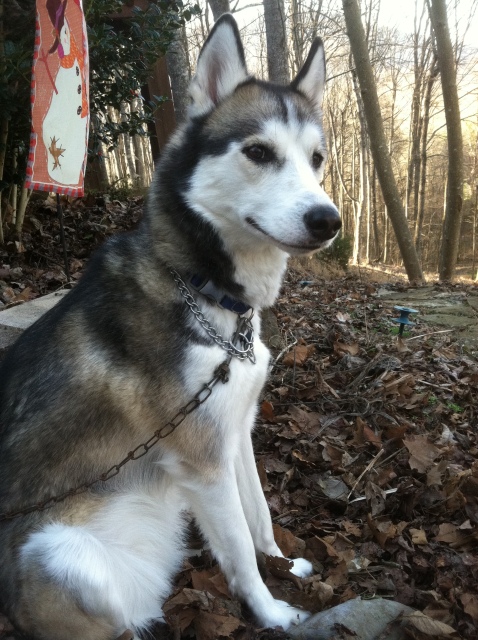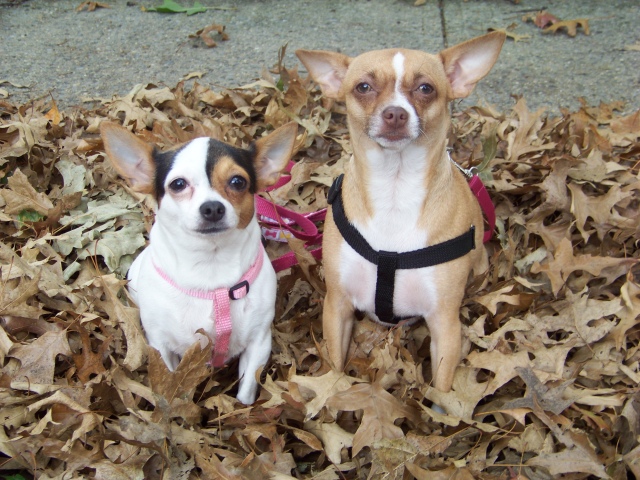QuestionQUESTION: In October of 2008, I adopted a two- to three-year-old female Border Collie from a local shelter. At the time of the adoption, she was malnourished, very timid and had been severely abused at her previous "home." She spent the first several weeks hidden under a table and would not come out to eat or use the restroom, but after some coaxing and reassurance, she blossomed into a playful, loving dog. She likes to run outside, chase squirrels and the neighborhood cats, eat heartily and is quite comfortable around the few people who come into the house on a regular basis. But despite all of this wonderful progress, we are still having some issues.
First, over the last year she will have periods when she will regularly mess in our livingroom. She will go for months at a stretch with no problems, then all of the sudden will begin using the restroom in the same spot in our living room (sometimes going several times a night), even after having her outside several times that day. Second, when we take her outside if a neighbor comes out into their backyard or a car backfires or generally any loud noise occurs, she will run onto the sun porch and refuse to come back out to use the bathroom. Then, on her next bathroom trip she will take three times as long to "get down to business" because she spends at least twenty minutes staring at the direction of the neighbors house or where the noise came from. Thirdly, she will not eat her food at one go (she is a grazer) and will only eat if someone is sitting at the kitchen table, making it difficult to time when she needs to outside. Finally, when I try to command her to go outside, she will crawl under the table, roll on her back, and lift her leg up showing her tummy to me. The more I try to coax her out, the more stubborn she becomes until I'm forced to pull her out by her collar while she very heavily stays in this submissive position.
She has never been formally trained and has been neutered. She has been fed Dr. Foster & Smith since we got her, and gets VitaLife treats (usually Chicken Chips, but occasionally other varieties of VitaLife treats). We initially fed her a little more than the recommended quantity simply because she was so skinny, but now that she has been neutered and is at a stable weight, we have reduced her to the recommended quantity. The only major changes in her environment has been the addition of a four-year-old male Pomeranian approximately six months ago. The Border Collie can be somewhat jealous of the Pom (if someone else is petting him, she will push him out of the way and beg to be petted herself (which she usually is)), but other than that they get along great. We've had some issues with the Pom eating her food and vice versa, but we've been trying to keep them separated at feeding time and keeping the leftovers picked up when they aren't eating.
She is a very sweet dog and given the conditions that she came from I can certainly understand why she might be confused about the house "rules," but my roommate (who owns the house) is getting more and more upset about the messes and it's to the point that if I don't find a way to curb these behaviors and get her back on track, I'll have to get rid of her.
My roommate/landlord wants me to only leave her food down for a short time and if she doesn't eat it, take it up anyway. He also wants me to only put her water down a few times a day, and crate her overnight so that she cannot get out to use the bathroom. On top of this, he thinks she should be outside from the time I get home until it gets dark, and that I should just leave her until she figures things out.
I think this is the wrong course of action and need a solution that will help her in these areas, but still be gentle and reaffirming. The last thing that I want to do is reabuse an abused dog. I would also like to find a way to make her more self assured so that when I relocate (I will be moving to a very big, very busy, very LOUD city in approximately six months) she will not be frightened or revert.
Can you suggest something for our situation?
ANSWER: Your care has been excellent to overcome the abuse issues. Your room mate is totally wrong in how to treat a formerly abused dog. A severly abused dog never forgets the abuse to return to a completely normal stateof mind. Part of the comfort of home and companionship is not to deny the dog food or water or companionship for long periods of time. Long being measured in hours. Crate the roommate all night and see how he likes it. Just kidding. The dog will likely have minor setbacks, usually triggered by things we don't notice but the dog with better hearing and scent does.
Normal obedience training will help build self confidence and well being in the dog, especially if it is the rally type with agility and other items included to bring out any phobias and provide mental stimulus. Adding the second dog may or may not help. Generally a companion dog for the dog is a good idea and if they get along fine its much better. The difficult part is making sure the Collie feels it has not sacraficed or lost some of its companionship with you as its leader. The Colllie would also benefit from training it to do various tricks to provide more happy memories and bury the abuse memories.
When you move, make sure to have music going when you are not home to help cover the city noise, or choose a quiet a domacile as possible sincethe dog is shy of loud noises from the abuse.
You can provide an open door crate with bedding inside and over the top to make it quiet. If there is no chewing problem [of the bedding] a thick comforter [get a cheap one, even rummage sale] that covers all but the door is fine.
Regards,
Henry Ruhwiedel
Westwind Kennels LLC
Regards,
---------- FOLLOW-UP ----------
QUESTION: Do you feel that her nightly messing might be linked to anything in particular and will putting her in obedience classes help curb this habit? Or is this strictly linked to how often she eats/drinks?
AnswerI would establish a regular schedule if you don't have one now. There is a lot of literature out there on potty training. Generally we follow the following: first AM, out, make sure the dog goes and provide praise and a tiny treat. feed the dog, back out again, wait till it goes, praise, tiny treat. Every two hours the remainder of the day until about 6-7 PM. If there is a second feeding, same as the AM. Provide a tiny amount of food, then potty around 9 (as you determine) and a last potty at bed time if more than 2 hrs before bedtime. No food or water during the night, or 2 hrs before bedtime. Adjust as necessary for your circumstances.
Don't scold the dog for going in the house, unless you catch the dog in the act, it has no memory of it after 3 seconds. Even then, just a NO, and an immediate trip outside with the usual praise and treat when it goes outside.
You can clean the area with Odo-Ban (Sam's club and elsewhere) with bleach to kill germs and odor and if not soaked in, the scent should not draw the dog back to the spot. If its carpet or cloth, no amount of cleaning will make it clean again.
Regards,
Henry Ruhwiedel
Westwind Kennels LLC

 Designating bathroom area
Question
backyard
I have 2 medium mutts that are both b
Designating bathroom area
Question
backyard
I have 2 medium mutts that are both b
 Dog jumps on counters, Refrigerator,cabinet tops when Im not home
Question
Bell
Hello,
I dont even know where to
Dog jumps on counters, Refrigerator,cabinet tops when Im not home
Question
Bell
Hello,
I dont even know where to
 puppy is shy - is this a deal breaker?
Question
Our baby!
Hi there - First of all, tha
puppy is shy - is this a deal breaker?
Question
Our baby!
Hi there - First of all, tha
 Is putting my dog in a cage a good form of punishment?
Question
Blue
My Siberian husky, Blue, as been b
Is putting my dog in a cage a good form of punishment?
Question
Blue
My Siberian husky, Blue, as been b
 My dog eats poop
Question
thats luna to the righ
Hello, how are you? I h
My dog eats poop
Question
thats luna to the righ
Hello, how are you? I h